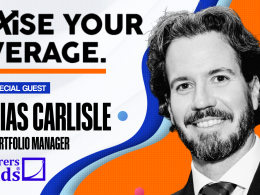ANDREW LO: Well, the adaptive markets hypothesis is really all about change. It applies the basic principles of evolution to economic phenomenon, including financial markets, and it says that individuals are self-interested, but they also make mistakes. They adapt to changing market conditions, and ultimately it’s going to be the successors, the ones who are successful at whatever endeavors they’re engaged in that will determine market dynamics- so the survival of the richest, if you will.
And the adaptive markets hypothesis differs from efficient markets in a sense that it recognizes that things don’t stay the same. Over a long period of time, if you have a very stable environment, then markets can look very efficient and stable, which is what we had for the great period of prosperity that we enjoyed in this country, but once environmental conditions change, that change is going to be reflected in the kind of competition, mutation, natural selection and ultimately evolution of financial markets that we have actually seen just over the last few years.
CONSUELO MACK: What are some of the other changes that you’re seeing as the markets adapt to these new situations?
ANDREW LO: Well, one of the biggest changes is global integration. The fact is that we now engage in financial transactions worldwide, and investors in China have a significant impact on homeowners in the United States and vice versa. We saw that over the last few years. That really has been facilitated by technology. So all of these issues really are consequences, unintended consequences of our technology, and the fact that we have tremendously powerful financial technology is a wonderful thing during good times, but during times of dislocation, they can create much quicker and deeper kinds of repercussions than ever before, so I think that’s another example of adaptation. We now have to adapt to this new world where technologies are much more powerful than ever before, and if we understand how to do that, I think we’ll develop even greater prosperity and stability, but we’re not there yet, and we need to go through this kind of gut-wrenching phase where we understand that there will be winners and losers, survivors and those who will perish, unfortunately, because of this kind of adaptation process.
CONSUELO MACK: Give us some guidance. I mean, you know, we all want to be survivors and winners. So what are some of the things that we can be doing with our individual portfolios to help us survive through these really wrenching periods in market volatility?
ANDREW LO: Well, the first thing is to spend more time focusing on these issues. I know that a number of individuals don’t really have the time to spend on their portfolios. They look at their statements maybe once a quarter at the most, and--
CONSUELO MACK: And that’s not enough anymore. Right?
ANDREW LO: That’s not enough, because things can change dramatically in a quarter. Things can change dramatically in a month, and so having greater awareness of our financial health, I think, is really critical to dealing with this kind of new environment.
CONSUELO MACK: And should we expect more or demand more from our financial advisors? I mean, a lot of financial advisors have trained their customers, for instance, to not look at their monthly statements and, you know, I have a long-term plan, I have a fixed asset allocation. Is that no longer valid and no longer enough?
ANDREW LO: Well, I think it may not be enough. I think that the paradigm that we’re dealing with now is far more complex than the existing 60/40 balanced portfolio approach to asset allocation. You know, it used to be the case that asset allocation advice was really a function of age and maybe your risk preferences, but the assumption was that once you fix those two, your age and the amount of risk that you’re willing to take, that a static asset allocation was the appropriate decision rule to use. The problem with that approach is that when markets are so unstable themselves, when the volatility of volatility becomes such an important factor, then 60/40 just doesn’t work anymore, and one has to be equally dynamic in responding to market shocks.
It’s still possible to be a passive investor, focusing on low fees, so that’s certainly a good thing, but you can be passive about investing and very active about risk management. I think that’s the new piece. The new piece is that we now have to be much more concerned about dealing with these kinds of shocks and then to respond to them quickly as opposed to sitting back and hoping that things will work out in the long run. In the long run, things may work out. We just have to make sure that the short run doesn’t kill us first.
CONSUELO MACK: So help us be more active in our risk management. What are the things that we should be doing to lessen our risk exposure?












